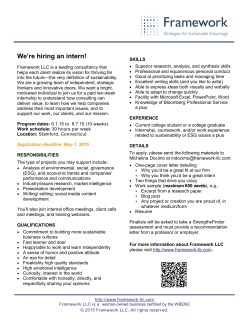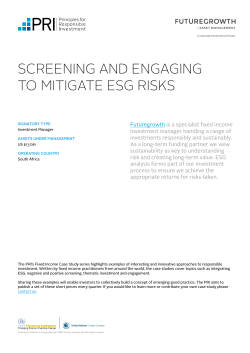
Cambridge FY16 ESG RFP
City of Cambridge Department of Human Service Programs Request for Proposals - FY2016 Emergency Solutions Grant The City of Cambridge’s Department of Human Service Programs (DHSP) is seeking proposals from nonprofit organizations for the Emergency Solutions Grant (ESG) program. For this Request for Proposals (RFP) DHSP anticipates awarding up to $ 140,867.00 in the following categories: (1) street outreach and (2) emergency shelter. All proposals must be received no later than 5:00 p.m. Wednesday, April 8, 2015. Please return the completed application packet to Michelle McCarthy on the 2nd floor of 51 Inman Street, Cambridge, MA and an electronic version of the application to mmccarthy@cambridgema.gov. Applications received after the deadline will not be considered. ESG Program Overview The ESG program, authorized by the McKinney-Vento Homeless Assistance Act as amended by the Homeless Emergency Assistance and Rapid Transition to Housing (HEARTH) Act, provides funding for street outreach, emergency shelter, homelessness prevention and rapid rehousing activities. To review additional requirements, details and program guidelines, please see the ESG Program Interim Rule.1 ESG regulations include, but are not limited to, the following items. Match Requirements Organizations selected for funding must match 100% of ESG funds using non-ESG sources. Applicants may use any of the following sources as match: Cash contributions, and Noncash contributions: The value of any real property, equipment, goods or services contributed to the program, provided that if the subrecipient had to pay for them with grant funds, the costs would be allowable. See section 576.201 of the ESG rule for additional details. Faith Based Activities ESG funds may be awarded to a subrecipient that is a primarily religious organization if the organization agrees to provide all eligible activities under this program in a manner that is free from religious influences and in accordance with ESG regulations. See 24 CFR Part 576.406. (a) Organizations that are religious or faith-based are eligible, on the same basis as any other organization, to receive ESG funds. Neither the Federal Government nor a State or local government receiving funds under ESG shall discriminate against an organization on the basis of the organization’s religious character or affiliation. (b) Organizations that are directly funded under the ESG program may not engage in inherently religious activities, such as worship, religious instruction, or proselytization as part of the programs or services funded under ESG. If an organization conducts these activities, these activities must be offered separately, in time or location, from the programs or services funded under ESG, and participation must be voluntary for program participants. 1 https://www.onecpd.info/resource/1927/hearth-esg-program-and-consolidated-plan-conforming-amendments/ 1 Project Requirements Cambridge Living Wage ESG subrecipients receiving funding of more than $10,000 will be subject to the Cambridge Living Wage Ordinance. The Cambridge living wage is currently $14.95/hour.2 HMIS Reporting requirements ESG subrecipients are required to collect HUD required data in a City-approved Homeless Management Information System (HMIS). HMIS requirements for ESG subrecipients are detailed in 24 CFR 576.400(f) and HUD’s 2014 HMIS Data Standards.3 ESG subrecipients will also be required to work with HMIS staff at the end of the contract year (July 2016) to complete the HUD required Consolidated Annual Performance and Evaluation Report (CAPER). Data quality compliance for Domestic Violence (DV) service providers ESG subrecipients who are domestic violence service providers and are providing ESG assistance to victims of domestic violence should not use HMIS, but should use a separate database (ex. ALICE) to record client data. DV providers are expected to comply with the same HMIS standards required by non-DV providers, and must work with HMIS staff to complete HUD reports. Coordinated Intake The Cambridge Continuum of Care (CoC) is working to develop and implement a coordinated intake/assessment system as required by the CoC Program Interim Rule. The ESG regulation requires all grantees to participate in the system to initially assess the eligibility and needs of each household seeking homeless assistance. ESG subrecipients will be expected to participate in the development of this system, and to participate in the system after it has been developed. See 24 CFR 576.400(e) for additional details about the Coordinated Intake requirement. Performance Goals With passage of the HEARTH Act, HUD continues to place increased emphasis on performance and outcomes measurement. DHSP encourages applicants to read Opening Doors, the Federal Strategic Plan to Prevent and End Homelessness4 and to include a description in the proposal narrative of how the project aligns with Federal goals and priorities, specifically ending chronic homelessness, homelessness among veterans, and homelessness among families and youth. Within the population of chronically homeless in the Cambridge CoC, the following subpopulations have been identified as having high priority by the Homeless Services Planning Committee (HSPC) and the City’s Senior Policy Group on Homelessness: 1. Chronically homeless individuals who are “high utilizers” of emergency services, including ambulance services, hospital services, police services and emergency shelter; and 2. Chronically homeless individuals who are long-term stayers in emergency shelters. 2 http://www.cambridgema.gov/~/media/Files/personneldepartment/Fact_Sheet_rev_03_01_15.ashx https://www.hudexchange.info/resources/documents/HMIS-Data-Standards-Manual.pdf 4 http://usich.gov/opening_doors/ 3 2 Performance Measurement In addition to the HUD required CAPER report referenced in the HMIS section, DHSP will begin collecting data during the City FY2016 ESG cycle to establish baseline measures against which future ESG performance will be measured. Additional details about this process will be provided during the contracting phase. Timeline March 17 RFP published and distributed April 8 Deadline for application submissions Week of April 13 ESG Review Panel meets May 2015 Award letters distributed July 1, 2015 Contract year begins Application Instructions and Checklist To be considered for funding, interested agencies must complete and submit the following items: Proposal Signed cover page Narrative response Budget table Attachments Job descriptions for positions to be partially or completely funded with ESG funds Resumes for staff in positions to be funded with ESG funds Current list of Board of Directors or Advisory Board Agency organizational chart Total annual agency budget Most recent agency audit (please submit an electronic version only) Policies and procedures for projects to be partly or completely funded with ESG funds which-at a minimum-detail the following: Intake and determination of eligibility Privacy and confidentiality of participant information Termination of assistance and participant appeal procedures 3 Scoring Criteria ESG funds are awarded annually through a competitive proposal evaluation process (as agreed to at the March 2013 CoC meeting). For FY2016, DHSP staff and the ESG Review Panel will begin reviewing proposals using the following scoring criteria: Partly satisfies Substantially satisfies Fully satisfies 15 20 25 Project activities – proposal clearly describes what activities project staff will conduct to help clients identify and meet their service and housing goals. 6 8 10 Persons served – proposal provides a clear and detailed description of persons to be served. 6 8 10 Outreach plan – proposal clearly describes how participants will be brought into the program including specific intake procedures. 6 8 10 Coordination – proposal clearly explains how the project will coordinate with other CoC resources. 6 8 10 Qualifications – 10 points possible Proposal and policy materials clearly demonstrate the experience and capacity of the project applicant as it relates to carrying out the activities of the project, including HMIS compliance.* 6 8 10 Budget detail – 15 points possible Budget request is reasonable and appropriate, items align to project activities; and costs are within funding guidelines. 9 12 15 Application – 10 points possible Narrative clearly and completely addresses each of the items outlined in the Instructions, and all required attachments are included and complete. 6 8 10 Component Project concept – 25 points possible Project is feasible and addresses Federal Strategic Plan goals, and local priority to serve chronically homeless, longterm stayers and/or high-utilizers. Does not satisfy Project design and activities – 40 points possible Total Score (100 points possible) Comments *HMIS compliance and financial management will be reviewed for current ESG recipients. 4
© Copyright 2025









